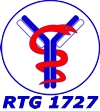TP9: Identification of the molecular and cellular effects of high dose IVIG therapy
High doses of intravenous immunoglobulins (IVIG) are successfully used in the therapy of many autoimmune diseases. However, the supply of IVIG is limited and the mode of action is controversially discussed. We hypothesize, that IVIG may excerpt its therapeutic effects through different mechanisms in individual diseases. In line with these clinical data, we have already shown, that IVIG is therapeutically effective in immunization-induced EBA. The aim of this project is identification of the molecular and cellular targets of IVIG therapy in immunization-induced EBA (J Pathol, 2011; Blood, 2011) . For this purpose EBA will be induced in mice, which are depleted for a certain subset of cells and/or certain Fc receptors. Primary readouts are the clinical score, the level of circulating and tissue bound autoantibodies, and complement deposition at the cutaneous basement membrane. Those insights into the mode of action of IVIG, we hope to develop either modified (more effective) IVIG preparations and/or to selectively modulate those molecules, which mediate the therapeutic effect of IVIG.
Elena Pipi graduated in 10/15 and now works as a PostDoc in Southhampton (UK).


- Projects
- Projects
- Associated projects
- MD projects
- Associated MD projects
- Concluded projects
- Concluded TP
- TP1 - Modulation of isotypes
- TP2 - Targeted fusion proteins
- TP3 - Selective FcRn inhibition
- TP4 - IL-35, Treg and EAE
- TP5 - Apoptotic cells
- TP6 - Mast cell / T cell interactions
- TP7 - Fc gamma receptors
- TP8 - IgG- and C-receptors
- TP9 - IVIG
- TP10 - HMGB1 Protein
- TP11 - IL15 / IL15Rα
- TP12 - S100 proteins
- TP13 - Treatment-refractory B cells
- TP A1 - Treatment strategies
- TP A2 - B cell inhibition
- TP A3 - IL-17 in EBA
- TP A4 - The pathophysiological role of Th17cells in Bullous pemphigoid
- TP A5 - C5a/C5aR
- TP A6 - Signals leading to glycosylated antibodies
- TP A7 - IL-16 & MIF in autoimmunity
- TP B1 - B cell transcriptome
- TP B2 - Antigen-specific T cells
- TP B3 - Metabolomics
- TP B4 - Resident plasma cells
- TP B5 - Anti-CD37 antibodies
- TP B6 - Systemic Sclerosis
- Concluded Ass.TP
- Concluded MD TP
- Concluded Ass. MD TP
- Concluded TP






